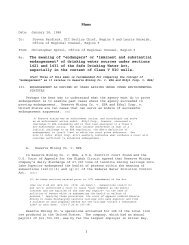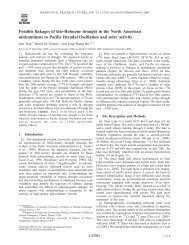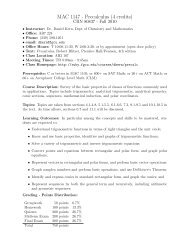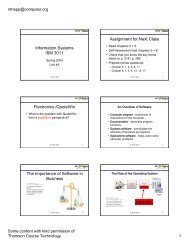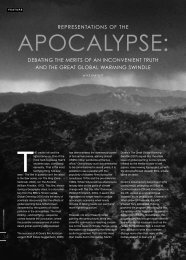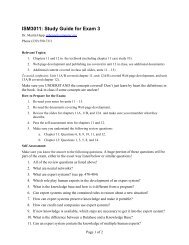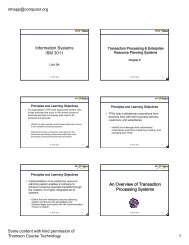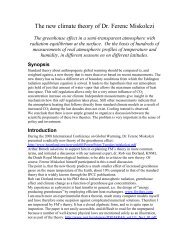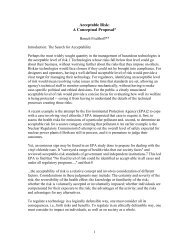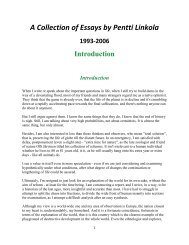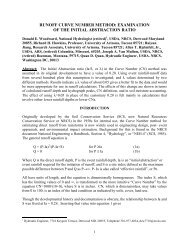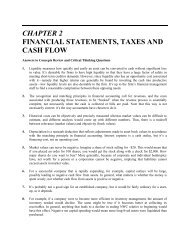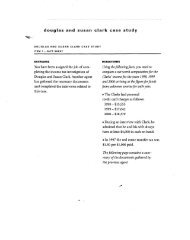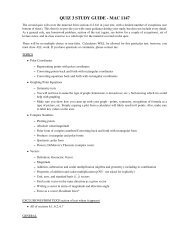Jean-Jacques Rousseau
Jean-Jacques Rousseau
Jean-Jacques Rousseau
- No tags were found...
You also want an ePaper? Increase the reach of your titles
YUMPU automatically turns print PDFs into web optimized ePapers that Google loves.
“Never exceed your rights, and they will soon becomeunlimited.”- ROUSSEAU<strong>Jean</strong>-<strong>Jacques</strong> <strong>Rousseau</strong>Philosopher, 1712 - 1778<strong>Jean</strong>-<strong>Jacques</strong> <strong>Rousseau</strong> was born on June 28, 1712 inGeneva, Switzerland. His mother died shortly after hisbirth. When <strong>Rousseau</strong> was 10 his father fled from Genevato avoid imprisonment for a minor offense, leaving young<strong>Jean</strong>-<strong>Jacques</strong> to be raised by an aunt and uncle.<strong>Rousseau</strong> left Geneva at 16, wandering from place toplace, finally moving to Paris in 1742. He earned his livingduring this period, working as everything from footman toassistant to an ambassador.<strong>Rousseau</strong>'s profound insight can be found in almost everytrace of modern philosophy today. Somewhat complicatedand ambiguous, <strong>Rousseau</strong>'s general philosophy tried tograsp an emotional and passionate side of man which hefelt was left out of most previous philosophical thinking.In his early writing, <strong>Rousseau</strong> contended that man isessentially good, a "noble savage" when in the "state ofnature" (the state of all the other animals, and thecondition man was in before the creation of civilization and1
society), and that good people are made unhappy andcorrupted by their experiences in society. He viewedsociety as "artificial" and "corrupt" and that the furtheringof society results in the continuing unhappiness of man.<strong>Rousseau</strong>'s essay, "Discourse on the Arts and Sciences"(1750), argued that the advancement of art and sciencehad not been beneficial to mankind. He proposed that theprogress of knowledge had made governments morepowerful, and crushed individual liberty. He concluded thatmaterial progress had actually undermined the possibilityof sincere friendship, replacing it with jealousy, fear andsuspicion.Perhaps <strong>Rousseau</strong>'s most important work is "The SocialContract" that describes the relationship of man withsociety. Contrary to his earlier work, <strong>Rousseau</strong> claimedthat the state of nature is brutish condition without law ormorality, and that there are good men only a result ofsociety's presence. In the state of nature, man is prone tobe in frequent competition with his fellow men. Becausehe can be more successful facing threats by joining withother men, he has the impetus to do so. He joins togetherwith his fellow men to form the collective human presenceknown as "society." "The Social Contract" is the "compact"agreed to among men that sets the conditions formembership in society.<strong>Rousseau</strong> was one of the first modern writers to seriouslyattack the institution of private property, and therefore isconsidered a forebear of modern socialism and2
Communism (see Karl Marx). <strong>Rousseau</strong> also questionedthe assumption that the will of the majority is alwayscorrect. He argued that the goal of government should beto secure freedom, equality, and justice for all within thestate, regardless of the will of the majority.One of the primary principles of <strong>Rousseau</strong>'s politicalphilosophy is that politics and morality should not beseparated. When a state fails to act in a moral fashion, itceases to function in the proper manner and ceases toexert genuine authority over the individual. The secondimportant principle is freedom, which the state is createdto preserve.<strong>Rousseau</strong>'s ideas about education have profoundlyinfluenced modern educational theory. He minimizes theimportance of book learning, and recommends that achild's emotions should be educated before his reason. Heplaced a special emphasis on learning by experience.3



